The benefits of setting realistic goals for sobriety

Unlocking the Power of Goal Setting in Addiction Recovery
Setting realistic goals is a cornerstone of effective addiction recovery. It empowers individuals to navigate the challenging journey of sobriety with clarity, motivation, and resilience. This article explores the vital role that achievable objectives play in fostering sustained recovery, highlighting strategies, benefits, and practical tips to establish and maintain meaningful, realistic goals.
The Psychological Roots of Goal Setting in Recovery
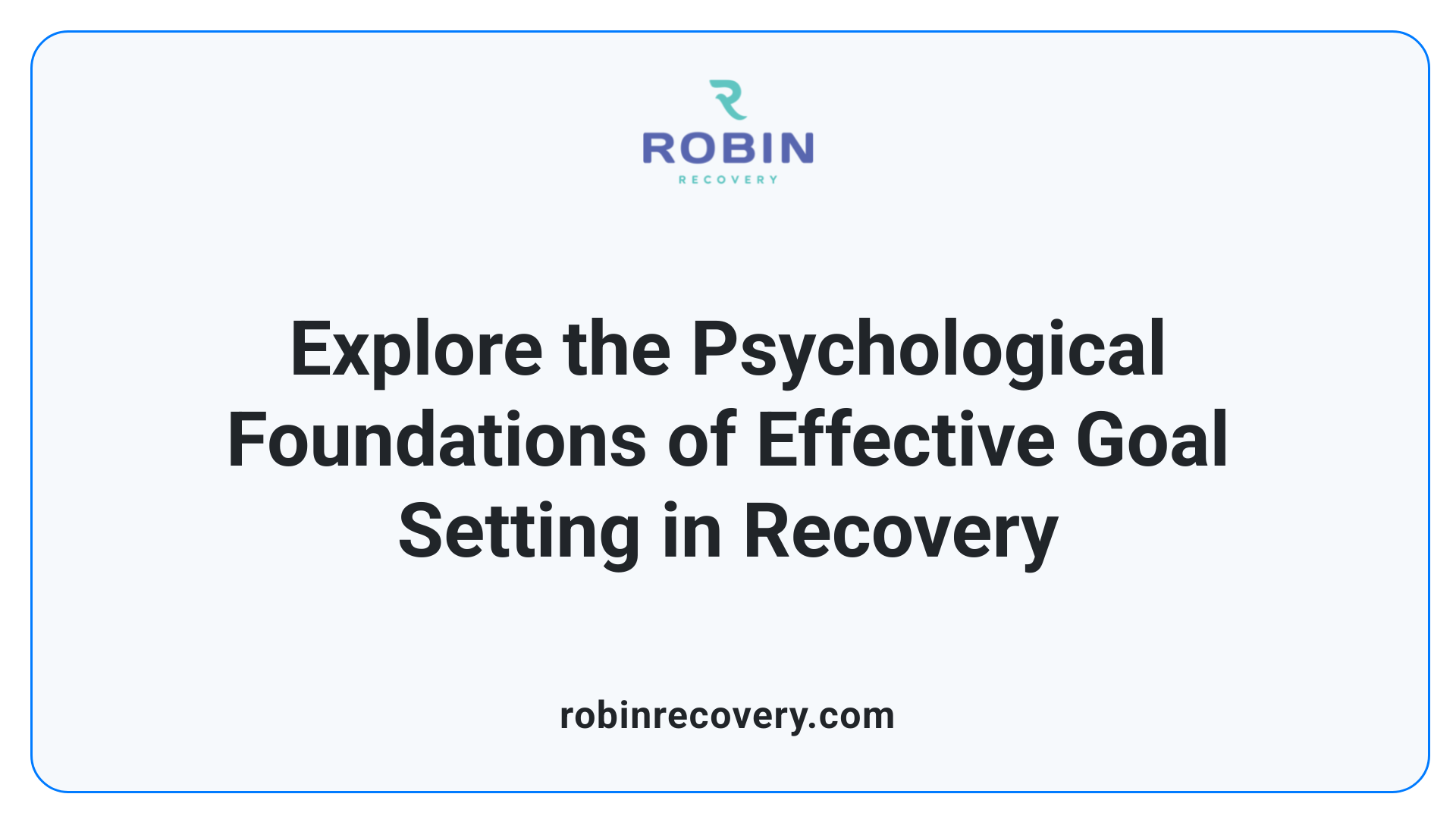
How does goal setting promote change and support decision-making during recovery?
Goal setting plays a vital role in fostering positive change during recovery from addiction. By establishing clear objectives, individuals can make smarter, more focused decisions about their wellness habits, which are essential for maintaining sobriety. Goals give direction, purpose, and motivation, helping individuals stay committed to their recovery path.
Setting achievable goals also builds confidence and self-esteem. Meeting small, realistic objectives like attending support groups or developing a daily routine boosts self-reliance and resilience. As progress occurs, these successes reinforce a sense of personal autonomy and foster a positive outlook.
What research theories support effective goal development?
Several psychological theories underpin the framework of effective goal setting. The SMART goals model emphasizes creating goals that are Specific, Measurable, Achievable, Relevant, and Time-bound, ensuring clarity and attainability.
The E-E-E (Evaluate, Execute, Evolve) model advocates for continuous assessment and adjustment of goals, encouraging flexibility in recovery strategies.
Additionally, the goal-setting theory of motivation highlights that setting challenging yet attainable goals can enhance effort and persistence, fostering long-term commitment.
Research also supports the ABC of goals—Aim high, Be specific, and Commit—making goals meaningful and motivating.
These theories collectively suggest that structured, personalized goals guide individuals toward sustained recovery, helping them manage triggers, develop coping strategies, and maintain focus on their long-term aspirations.
Strategies for establishing and maintaining realistic sobriety goals
To set and uphold realistic goals, individuals should start by applying the SMART criteria. This ensures goals are well-defined and achievable within a set timeframe. Breaking larger objectives into smaller, manageable steps reduces feelings of overwhelm and provides a clearer path forward.
Support systems are crucial—collaborating with health professionals, support groups, and trusted family members can foster accountability and encouragement.
Tracking progress through journals, apps, or calendars reinforces commitment and provides tangible evidence of success, boosting motivation.
Celebrating small victories along the way nurtures confidence and sustains momentum.
Remaining flexible is equally important. Life’s unpredictability means goals should be adaptable, allowing adjustments without feeling like setbacks.
Addressing potential triggers by developing coping strategies, such as mindfulness, stress management, or engaging in hobbies, helps prevent relapse.
Finally, setting diverse goals that cover physical health, emotional well-being, social connections, and personal growth promotes a comprehensive approach to recovery. Regular self-assessment and ongoing professional support ensure that goals remain relevant and attainable, cultivating resilience and long-term sobriety.
Creating a Purposeful Roadmap to Sobriety
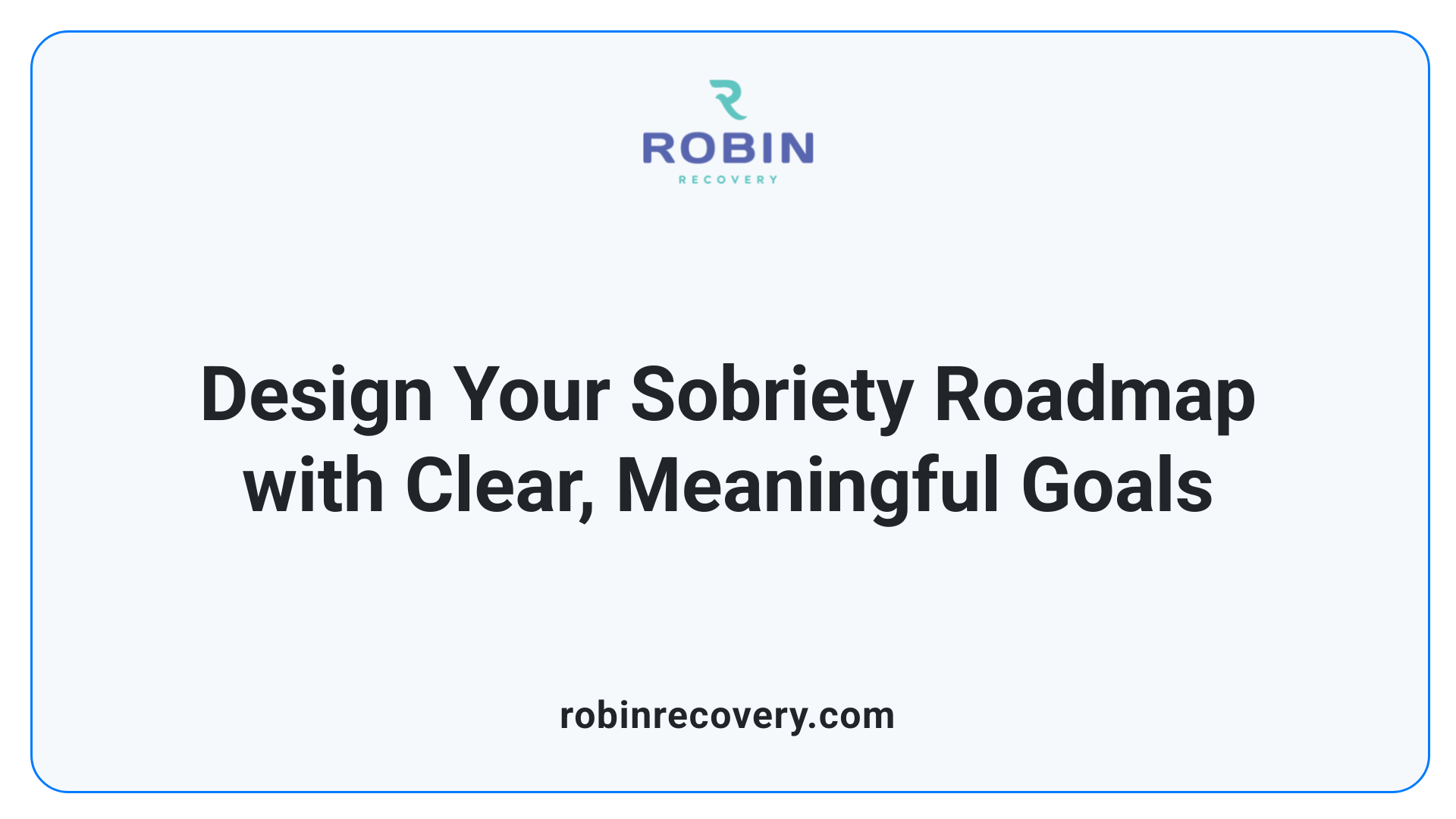
What is the significance of goal setting during addiction recovery?
Setting goals plays a vital role in addiction recovery by giving individuals a clear sense of direction and purpose. Well-defined objectives act as a roadmap, guiding individuals through their journey toward sobriety and helping them stay focused on positive actions. When people set specific, measurable, attainable, relevant, and time-bound (SMART) goals, they create a structured plan that increases their chances of success.
Goals such as attending support group meetings regularly, establishing healthier routines, or working toward relationship rebuilding serve as tangible steps toward long-term recovery. These objectives boost motivation and build self-confidence by providing a sense of achievement at each milestone.
Furthermore, goal setting empowers individuals by giving them control over their lives. It helps counter feelings of hopelessness often associated with addiction and replaces them with hope and resilience. Effective goals also help fill the void left by substance use with purposeful activities that foster personal growth.
Research shows that establishing and working through realistic goals decreases the risk of relapse, improves mental health, and supports overall well-being. In addition, setting small, achievable goals sustains momentum and fosters a positive outlook, reinforcing the belief that recovery is possible. Overall, goal setting during addiction recovery creates a foundation for lasting change, personal empowerment, and a healthier, substance-free life.
Practical Strategies for Setting and Achieving Goals
How do you set realistic goals for recovery?
Establishing realistic goals in recovery involves a thoughtful process that ensures objectives are attainable and meaningful. Using the SMART framework (Specific, Measurable, Achievable, Relevant, Time-bound) helps individuals craft clear and practical goals tailored to their unique circumstances. For example, instead of aiming to completely overhaul life overnight, a recovery-focused goal might be attending two support group meetings weekly or maintaining a daily mindfulness practice.
Breaking down long-term aspirations into smaller, manageable steps is crucial. Starting with short-term goals like improving daily routines, caring for health, or reconnecting with loved ones builds confidence and momentum. Over time, these small achievements serve as building blocks toward larger goals, such as finding stable housing, returning to education, or pursuing a meaningful career.
In the early stages, focusing on immediate priorities such as safely completing detox, engaging in therapy, and learning coping strategies lays a strong foundation. Setting practical objectives like maintaining a balanced diet or establishing a daily routine can help manage expectations and prevent frustration.
Support networks and accountability are vital. Enlisting help from family, friends, or support groups encourages persistence and resilience. Celebrating small successes along the way boosts confidence and keeps motivation high.
Overall, realistic goal setting in recovery embraces flexibility, allowing adjustments as circumstances evolve. By systematically setting achievable milestones and tracking progress, individuals foster a sense of control and ownership over their sobriety journey, supporting long-term stability and well-being.
The Critical Role of Support and Flexibility
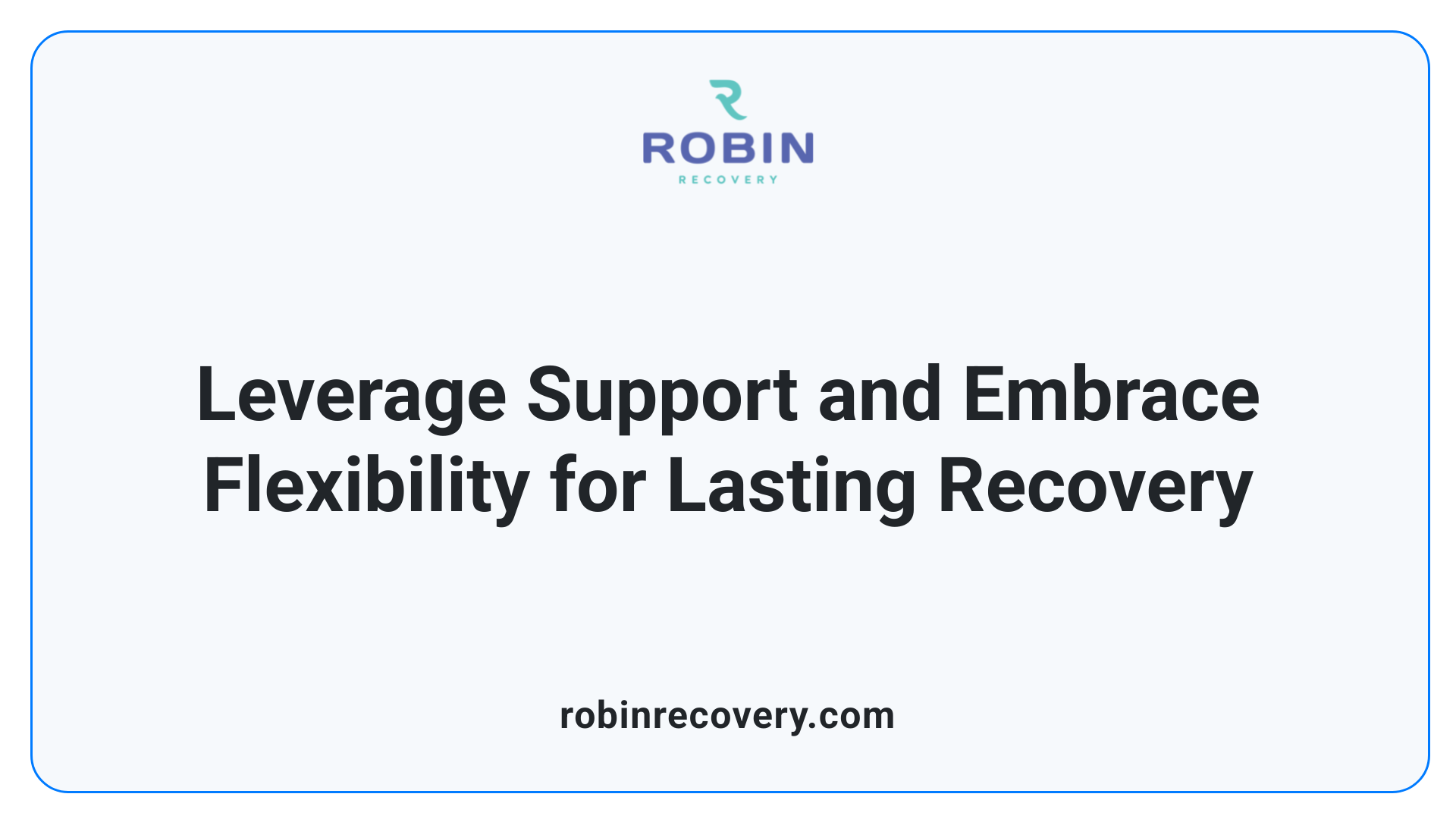
Support networks such as therapy, support groups, and family play vital roles in helping individuals establish and stick to realistic sobriety goals. These systems provide encouragement, accountability, and a sense of belonging, making it easier to stay motivated and committed.
Flexibility in goal setting is equally important. Life's unpredictable nature and unforeseen setbacks mean that rigid goals can sometimes lead to frustration or discouragement. Being adaptable allows individuals to modify their goals as needed, maintaining progress without feeling overwhelmed.
To create sustainable goals, it is helpful to use the SMART framework—setting goals that are Specific, Measurable, Achievable, Relevant, and Time-bound. Breaking larger objectives into smaller, manageable steps makes the process less intimidating and provides clear markers of success.
Regularly tracking progress and celebrating small wins bolster motivation and reinforce positive behaviors. Developing coping strategies, such as stress management techniques or mindfulness practices, helps in addressing triggers and prevents relapse.
Furthermore, incorporating goals in various areas—physical health, emotional well-being, social connections, and personal development—supports a comprehensive recovery. Collaborating with healthcare professionals and support networks offers personalized guidance and fosters accountability.
Finally, practicing self-compassion and patience is crucial. Recognizing that recovery is a non-linear journey and being gentle with oneself during setbacks encourages resilience.
Overall, combining strong support systems with flexible, well-structured goals lays a robust foundation for long-term sobriety and personal growth.
Tracking Progress and Cultivating Self-Compassion
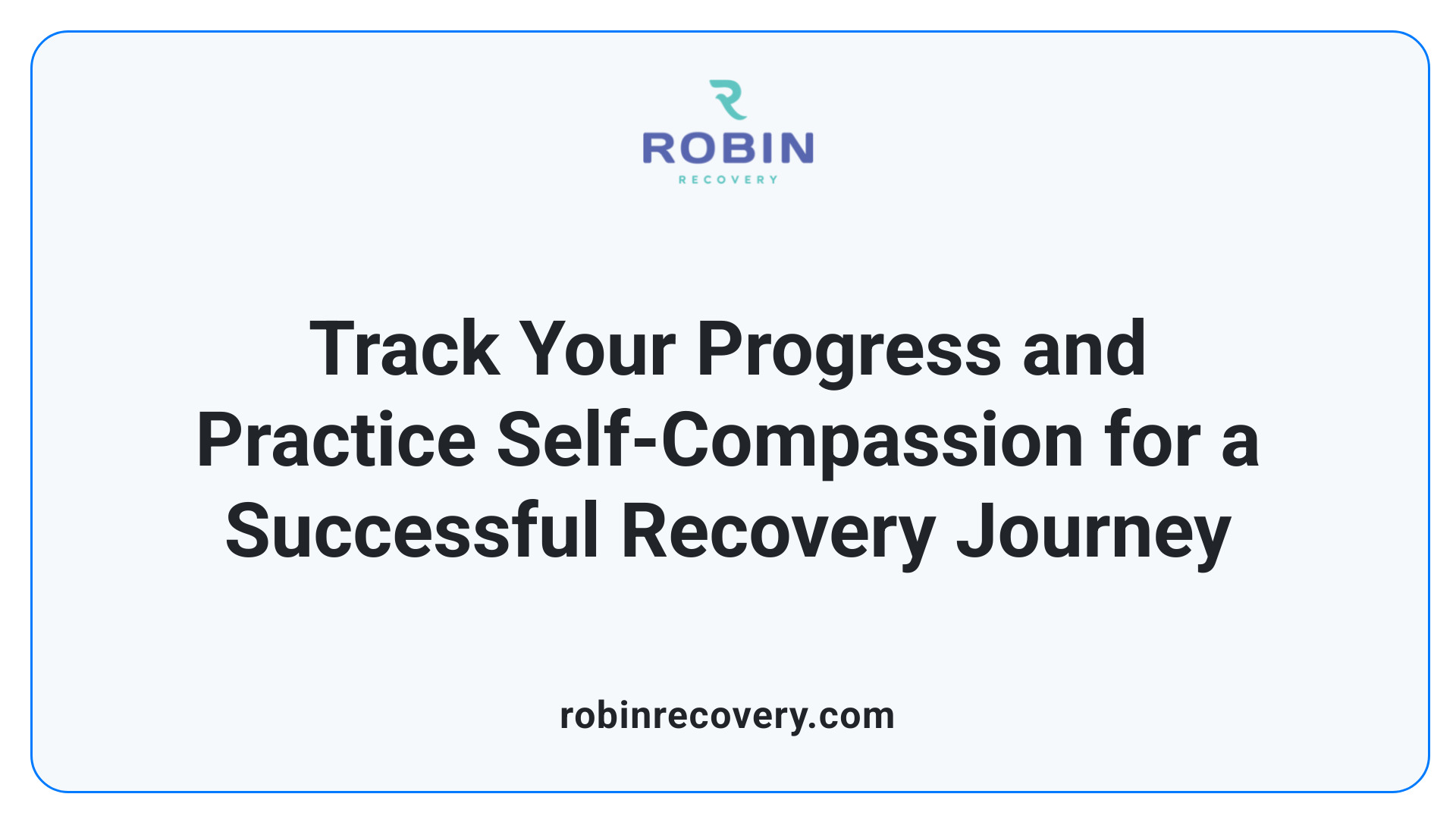
Benefits of writing down goals and tracking progress
Writing down recovery goals and consistently tracking progress serve as powerful tools for motivation and accountability. When individuals document their objectives and note achievements, it reinforces a sense of accomplishment and provides clear evidence of their efforts. Using journals, apps, or calendars helps visualize progress, making large goals feel more manageable. This practice also facilitates self-reflection, allowing individuals to recognize patterns, identify obstacles, and adjust strategies accordingly.
Role of self-compassion and patience in recovery
Recovery is a non-linear journey, often accompanied by setbacks and challenges. Practicing self-compassion and patience is vital for maintaining resilience during difficult times. Instead of harsh self-criticism, fostering kindness toward oneself encourages continued effort and reduces feelings of shame. Recognizing that setbacks are part of the process helps individuals stay motivated and focused on long-term goals, promoting emotional well-being and stability.
Why is setting realistic goals important in sobriety?
A realistic goal is achievable, which helps motivate continued effort. Unrealistic goals can lead to frustration and giving up, hindering recovery.
Long-term Success and Personal Growth in Recovery
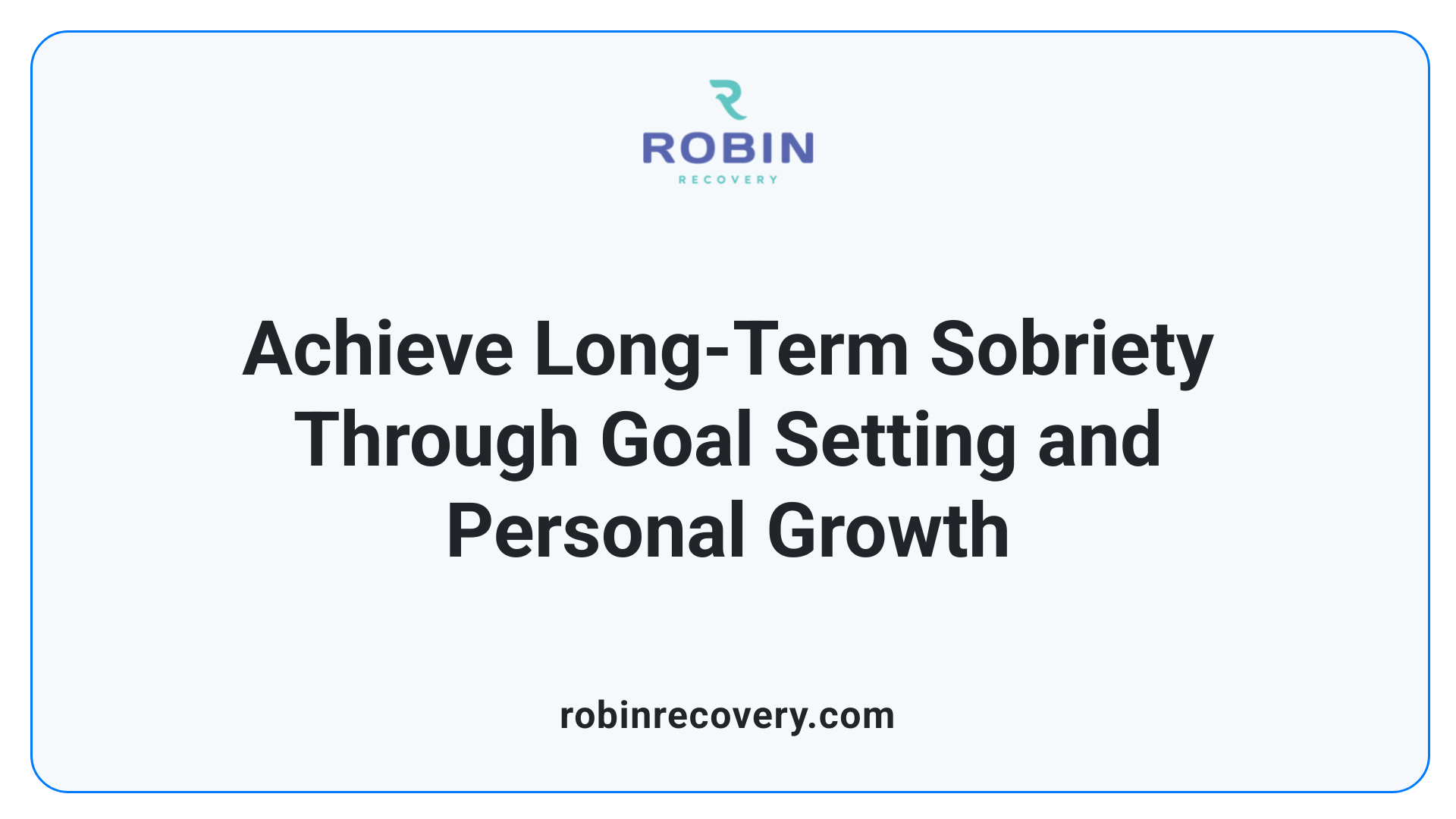
What are the benefits of setting goals in addiction recovery?
Setting goals plays a crucial role in the recovery process. It offers numerous advantages that help individuals stay focused and motivated on their journey to sobriety. By establishing clear objectives, people can cultivate hope and maintain a positive outlook, which are vital for long-term success.
Goals also help individuals recognize what truly matters to them, making recovery more personalized and meaningful. Small, achievable milestones, such as attending support group meetings or practicing mindfulness daily, build confidence and demonstrate progress. These victories serve as encouragement to continue moving forward.
Flexibility is a vital aspect of goal setting. Life can bring unforeseen challenges; adaptable goals allow individuals to adjust their plans without losing momentum. Collaboration with therapists, sponsors, or loved ones fosters a sense of autonomy and personal agency, empowering individuals to take charge of their recovery.
Furthermore, setting and working towards well-defined goals can strengthen social bonds through shared accountability. It also guides the development of healthy habits, improves mental health, and supports building fulfilling relationships. Overall, goal-oriented recovery enhances well-being and resilience, making lifelong sobriety more achievable.
Celebrating milestones and small victories.
Recognizing and celebrating progress, whether small or large, reinforces a positive mindset. Completing a week of sobriety, securing stable housing, or rebuilding trust in relationships are significant achievements. These milestones boost self-esteem and serve as motivation to pursue further goals.
Celebrating small wins creates a sense of accomplishment and encourages continued effort. It helps individuals see their journey as a series of progress, not perfection. Implementing reward systems or sharing successes with support networks enhances this effect, fostering hope and perseverance.
Holistic approach: mental health, healthy habits, building relationships, and life skills.
Sustainable recovery extends beyond abstinence from substances. It involves nurturing mental health through therapy and mindfulness, adopting healthy habits like regular exercise and balanced nutrition, and fostering strong relationships. Developing life skills — such as effective communication, time management, and emotional regulation — equips individuals to handle daily challenges.
A comprehensive, holistic approach ensures all aspects of well-being are addressed, reducing the risk of relapse and supporting a fulfilling life. Integrating goal setting within this framework helps individuals create a balanced, purposeful lifestyle, reinforcing their long-term commitment to recovery.
Fostering Hope and Resilience Through Realistic Goals
In conclusion, setting realistic, achievable goals is fundamental to successful sobriety. It provides a structured pathway, boosts motivation, and supports psychological resilience. Employing strategies like SMART goal criteria, coupled with ongoing support, flexibility, and self-compassion, individuals can forge a meaningful and sustainable recovery journey. Celebrating progress at every stage fosters hope, empowers personal growth, and ultimately leads to a fulfilling life free from substance dependence.
References
- Psychology of Effective Goal Setting in Addiction Recovery | St. Joseph
- The Importance of Setting Goals in Recovery - Harris House
- How Ohio Treatment Center Can Help You Set Realistic Goals for ...
- Setting Goals for Recovery Success - McShin Foundation
- What Are Some Long-Term Goals For Sobriety?
- Goal Setting in Addiction Recovery Tips and Real-Life Examples
- How to Cultivate Realistic Goals in Addiction Recovery
- Easy Guide to Setting Goals in Addiction Recovery | Northpoint Idaho
